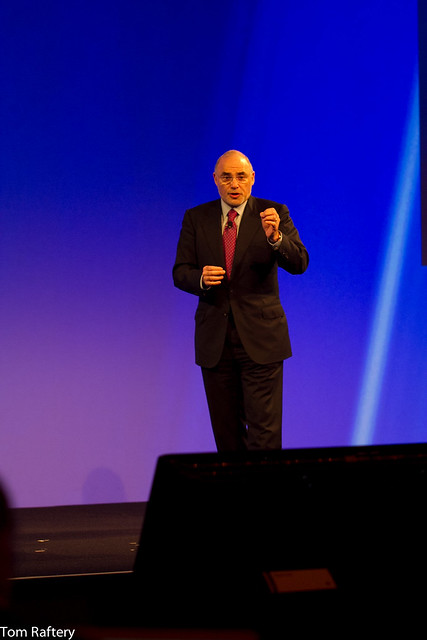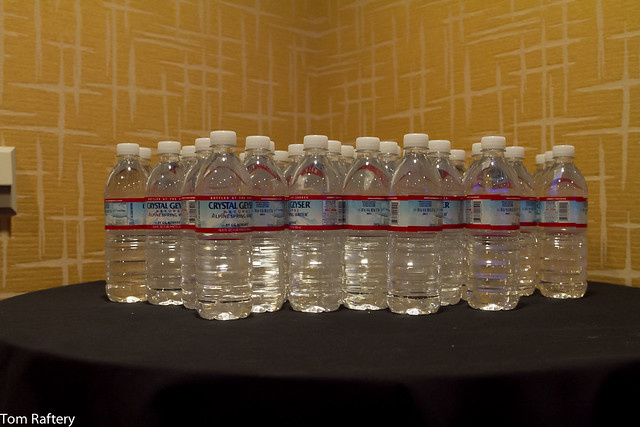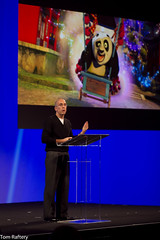
So I wrote a post the other day entitled Have HP?s senior executives lost interest in Sustainability? after attending a HP event in San Francisco. It was a little unfair because I concentrated on the lack of mentions of Sustainability by senior management on the first day of the event while leaving out the fact that I had interesting discussions with people involved in sustainability initiatives within HP the following day.
One of those I talked to at the event, Deb Lyons, was concerned enough by my piece that she went to the trouble of emailing me some of HP’s more impressive Green initiatives:
- HP published a fascinating paper [PDF] to quantify the carbon savings associated with switching from analog to digital printing and came up with a savings of somewhere between 114-251 MMtCO2 eq per annum (MMt CO2 is million metric tonnes of CO2) – similar to the savings which would be achieved by a broad implementation of lighting automation or extensive implementation of telecommuting!
- When printing is absolutely necessary, HP have comprehensive paper conservation and sourcing policies which include “a goal that 40 percent or more of the HP branded paper sold will be Forest Stewardship Council (FSC) certified or have more than 30 percent post-consumer waste content by the end of 2011”, an Eco Printing Assessment for customers and a reduction of paper shipped “in the box”
- While HP has yet to release its 2010 CSR report, its 2009 one is online and, in fairness, it is one of the better CSR reports produced by a tech co. (though it has a long way to go to catch-up to SAP’s 2010 Sustainability Report, which was released this morning!).
- I referenced the fact in my previous post that HP is becoming a devices company (between desktops, laptops, and more recently tablets and smartphones) so it is heartening to see HP have comprehensive policies around sourcing conflict minerals in Africa
- and finally, HP announced the other day that it had exceeded its target of reducing the energy footprint of its products by 40% by the end of 2011 and now HP products are 50% more energy efficient than they were five years ago. The release from HP went on to assert that “if all makes and models of printers, notebook and desktop PCs, displays and servers shipped in 2005 were recycled and replaced with new HP energy-efficient models, customers could save approximately $10.4 billion in energy costs, and avoid more than 40 million metric tons of CO2 emissions within a year” – a pretty impressive numbers!
Another release Deb pointed out to me was an announcement that HP are helping Shell extract oil and gas more efficiently from the ground – personally I believe that any technology which helps increase the amount of fossil fuels we burn should be criminalised, not praised, but that’s just me!
So, leaving aside the oil and gas announcement, HP’s green credentials do appear to be completely genuine, laudable even.
Kudos to HP for these and their other Green initiatives – however, I still believe it was a mistake for their executives not to have them as a theme running through their talks. I understand the HP thinking that “Sustainability is part of our DNA, so much so that we take it for granted that it is built-in to everything we do” – I’m paraphrasing liberally. But, the issue is that if your executives are not talking about sustainability, your stakeholders may not be as convinced about your commitment to sustainability. If Sustainability was left out of the talks because there was a lot of content to be worked in which had to be prioritised, just how far down the list of HP’s priorities does Sustainability lie? From talking to HP, I know it is not far down at all, but listening to their executives, you would not get that impression.
HP has a messaging problem around Sustainability. It isn’t that they don’t do Sustainability, it is just that they seem to be shy about talking about it. With the rise and rise of Ethical Consumerism, this shrinking wallflower attitude may not be Sustainable!
You should follow me on Twitter here
Photo credit Tom Raftery



